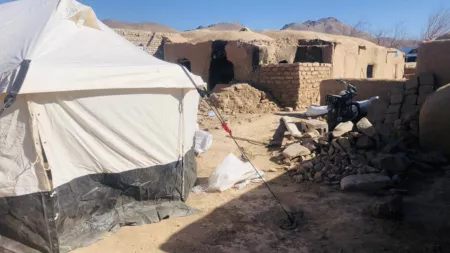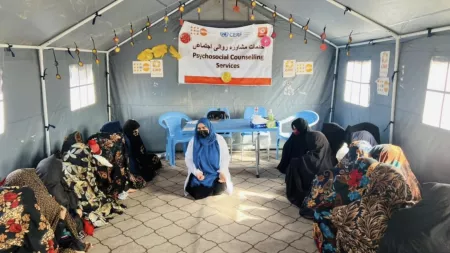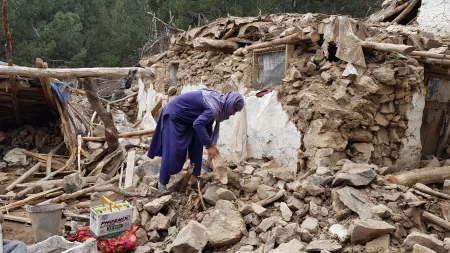One year ago, from October 7 to 15, 2023, Afghanistan was hit by three devastating earthquakes in just one week, each measuring 6.3 in magnitude. The quakes resulted in widespread destruction, resulting in more than 1,500 casualties with over 90 per cent of those reportedly killed were women and children, impacting over 275,000 individuals.
"While many homes have been rebuilt, the vulnerabilities we saw then are still very real."Graham Davison, CARE Afghanistan Director
“One year after the devastating Herat earthquakes, the situation for women and girls remains dire. While many homes have been rebuilt, the vulnerabilities we saw then are still very real,” said Graham, CARE Afghanistan Director. "Our team was among the first responders, delivering essential healthcare and psychosocial support. We've supported 95,700 lives and continue our recovery efforts, ensuring women and girls receive the vital assistance they need."
While some progress has been made in rebuilding, Afghan women continue to face disproportionate challenges, including trauma and economic instability.
Coping with fear and finding stability

Before the earthquake, Zahra’s* life was simple. She and her husband worked on their farm, building a life for their family. But when the ground shook in October 2023, everything changed. Their house collapsed, and Zahra suffered a severe head injury, leaving her with physical pain and a sense of hopelessness. With their home gone, Zahra was overwhelmed by sadness and anxiety, struggling to find a way forward.
"The support brought hope back into my life when I thought there was none."Zahra, earthquake survivor, participant of CARE's psychosocial counseling services.
When CARE’s Psychosocial Support (PSS) team arrived in her community, she reached out for help. The counselors recognized the deep emotional impact the disaster had on her. Through individual counseling, group sessions, and community activities, the Psychosocial support team taught her techniques to manage her emotions and cope with trauma. "The support brought hope back into my life when I thought there was none," she said.

For Amina*, a mother of three, the earthquake not only destroyed her home but also her sense of safety. With her husband injured and unable to work, Amina was haunted by fear and sleepless nights. Struggling to keep her family afloat, she faced an overwhelming sense of despair.
When CARE began the work in her community, Amina found a lifeline. Through psychosocial counseling, she learned to cope with her fears and rebuild her resilience. The financial support also allowed her to repair her home and meet her family's needs, bringing back a sense of stability. CARE’s cash assistance programs empower underserved women to make informed decisions regarding their resources, allowing them to prioritize their essential needs during times of crisis.
"Receiving support changed my life," she said. "The counseling helped me heal, and the cash assistance allowed us to rebuild our home. It gave us hope." But like so many Afghan women, Zahra and Amina’s road to recovery is ongoing.
"The counseling helped me heal, and the cash assistance allowed us to rebuild our home. It gave us hope."Amena, earthquake survivor, participant of CARE's psychosocial counseling services.
A long road ahead: Continuing support for Afghan women
Together with partners, CARE Afghanistan's response to the Herat earthquake includes providing food through 15 community kitchens run by 160 women and offering essential healthcare services. The team is also helping improve farming and livelihoods, while delivering emergency assistance like household supplies and warm clothing for 731 households. CARE Afghanistan has also established family health centers to offer critical health services and psychosocial support to over 10,000 individuals.
As the recovery efforts continue, the focus remains on enhancing the well-being of affected households and addressing the ongoing challenges faced by women and girls.
While the world's attention shifts to new crises, Afghan women continue to face a struggle for their basic rights to safety, education, freedom of movement and expression. Stories like Zahra's and Amina's are just a glimpse into the many untold struggles of Afghan women endure every day. Their resilience is being tested daily and far from over. With the support of the international community and donors – sustained and flexible funding, we can help women and girls in Afghanistan to rebuild their lives after the earthquake. Let us not forget them.
*The names have been altered to safeguard the privacy.
